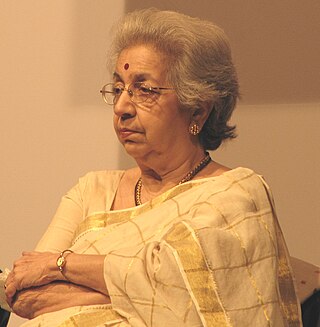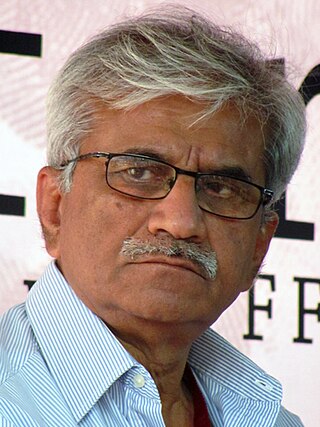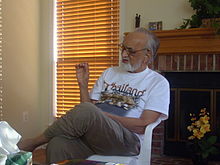
Vijaya Mehta, is a noted Indian Marathi film and theatre director and also an actor in many films from the Parallel Cinema. She is a founder member of Mumbai-based theatre group, Rangayan with playwright Vijay Tendulkar, and actors Arvind Deshpande and Shriram Lagoo. She is most known for her acclaimed role in film Party (1984) and for her directorial ventures, Rao Saheb (1986) and Pestonjee (1988). As the founder member of theatre group, Rangayan, she became a leading figure in the experimental Marathi theatre of the 1960s.
Mahesh Elkunchwar is an Indian playwright and screenplay writer in Marathi language with more than 20 plays to his name, in addition to his theoretical writings, critical works, and his active work in India's Parallel Cinema as actor and screenwriter. Today along with Vijay Tendulkar, he is credited as one of the most influential and progressive playwrights not just in Marathi theatre, but also in Indian theatre. In 2014, he was awarded the Sangeet Natak Akademi Fellowship, the highest honour in performing arts in India.

Dr. Jabbar Patel is a former paediatrician and a Marathi-language theatre and film director of India. His production of the play Vijay Tendulkar's play Ghashiram Kotwal, in 1973 is considered a classic in Modern Indian Theatre.

Ghashiram Kotwal is a Marathi play written by playwright Vijay Tendulkar in 1972 as a response to the rise of a local political party, in Maharashtra. The play is a political satire, written as historical drama. It is based on the life of Nana Phadnavis (1741–1800), one of the prominent ministers in the court of the Peshwa of Pune and Ghashiram Kotwal, the police chief of the city. Its theme is how men in power give rise to ideologies to serve their purposes, and later destroy them when they become useless. It was first performed on 16 December 1972, by the Progressive Dramatic Association in Pune. Jabbar Patel's production of the play in 1973 is considered a classic in Modern Indian Theatre.

Sudhindra Sircar, also known as Badal Sarkar, was an influential Indian dramatist and theatre director, most known for his anti-establishment plays during the Naxalite movement in the 1970s and taking theatre out of the proscenium and into public arena, when he transformed his own theatre company, Shatabdi as a third theatre group. He wrote more than fifty plays of which Ebong Indrajit, Basi Khabar, and Saari Raat are well known literary pieces. A pioneering figure in street theatre as well as in experimental and contemporary Bengali theatre with his egalitarian "Third Theatre", he prolifically wrote scripts for his Aanganmanch performances, and remains one of the most translated Indian playwrights. Though his early comedies were popular, it was his angst-ridden Evam Indrajit that became a landmark play in Indian theatre. Today, his rise as a prominent playwright in 1960s is seen as the coming of age of Modern Indian playwriting in Bengali, just as Vijay Tendulkar did it in Marathi, Mohan Rakesh in Hindi, and Girish Karnad in Kannada.
Madhukar Vasudev Dhond was a literary and art critic from Maharashtra, India.

Satyadev Dubey was an Indian theatre director, actor, playwright, screenwriter & film director. He was awarded the Sangeet Natak Akademi Award in 1971.
Shantata! Court Chalu Aahe is a Marathi play written by Indian playwright Vijay Tendulkar in 1963 and first performed in 1967, directed by Arvind Deshpande, with Sulbha Deshpande as the main lead.
Sakharam Binder is a play by Indian playwright Vijay Tendulkar written in Marathi and first performed in 1972. It was banned in India in 1974. It was produced and directed by Kamlakar Sarang.
Mohan Gokhale was an Indian film, television and theater actor who has worked in art films such as Sparsh, Bhavni Bhavai and Mirch Masala. His father was a senior journalist and Editor of the weekly Swarajya and Assistant Editor of Sakal in Pune.

Nilu Phule was an Indian actor known for his roles in Marathi movies and Marathi theatre. Nilu Phule acted in around 250 Marathi and Hindi movies during his film career. He was most prominently seen playing the roles of notorious villains in the movies.
Bhaskar Chandavarkar was an Indian sitar player, academic and film and theatre composer who worked with well-known directors of Indian cinema like Mrinal Sen, Girish Karnad, Aparna Sen, K. G. George and Amol Palekar in various languages including Marathi, Hindi, Kannada, Malayalam, Bengali and Oriya and was known for his blending of Indian classical and western music.

Shyamanand Jalan was a Kolkata-based Indian theatre director, and actor. He is credited for the renaissance period of modern Indian theatre and especially the Hindi theatre in Kolkata from the 1960s to 1980s. He was the first to perform modernist Mohan Rakesh, starting with Ashadh Ka Ek Din in 1960 and in the coming years bridged the gap between Hindi theatre and Bengali theatre, by mounting Hindi productions of works by Bengali playwrights, like Badal Sircar's Evam Indrajit (1968) and Pagla Ghora (1971), which in turn introduced Sircar to rest of the country. In 2005, he directed his first and only film Eashwar Mime Co., which was an adaptation of Dibyendu Palit's story, Mukhabhinoy, by Vijay Tendulkar.
Samik Bandyopadhyay is a Kolkata-based critic of Indian art, theatre and film.

Marathi theatre is theatre in the Marathi language, mostly originating or based in the state of Maharashtra in India, and elsewhere with Marathi diaspora. Starting in the middle of the 19th century, it flourished in the 1950s and 1960s. Today, it continues to have a marked presence in the State of Maharashtra with a loyal audience base, when most theatre in other parts of India have had tough time facing the onslaught of cinema and television. Its repertoire ranges from humorous social plays, farces, historical plays, musical, to experimental plays and serious drama of the 1970s onwards, by Vijay Tendulkar, P. L. Deshpande, Mahesh Elkunchwar and Satish Alekar, which have influenced theatre throughout India. In the post-independence era, Bengali theatre, and Marathi theatre have been at the forefront of innovations and significant dramaturgy in Indian theatre.

Sulabha Deshpande was an Indian actress and theatre director. Apart from Marathi theatre and Hindi theatre in Mumbai, she acted in over 73 mainstream Bollywood films. She also performed in art house cinema such as Bhumika (1977), Arvind Desai Ki Ajeeb Dastaan (1978), and Gaman (1978) as a character actor, along with numerous TV series and plays. A leading figure in the experimental theatre movement of the 1960s, she was associated with Rangayan, and personalities like Vijay Tendulkar, Vijaya Mehta, and Satyadev Dubey. In 1971, she co-founded the theatre group Awishkar with her husband Arvind Deshpande, and also started its children's wing, Chandrashala, which continues to perform professional children's theatre. In later years, she acted in serials such as Jee Ley Zara, Ek Packet Umeed, Asmita and in films such as English Vinglish.
Daji Bhatawadekar, was an Indian theatre personality and film and television actor. He was credited with the revival of Sanskrit and Marathi theatre in India. A winner of the Sangeet Natak Akademi award in 1965, he was honoured by the Government of India in 1967, with the award of Padma Shri, the fourth highest Indian civilian award for his contributions to the society.
Mitrachi Goshta is a Marathi-language play by Indian playwright Vijay Tendulkar. It was first performed in 1981, and has been described as one of the first modern Indian plays dealing with lesbian themes or same-sex attraction.
Ghashiram Kotwal is a 1976 Indian Marathi-language film, which is an adaptation of Vijay Tendulkar's play of the same name. Tendulkar himself wrote the screenplay. Coming at the height of the Parallel cinema movement in India, the film was an experiment in collective filmmaking. It was produced by YUKT Film Cooperative, a 16-member collective consisting mostly of graduates of the Film and Television Institute of India. The title role was played by Om Puri, who made his debut with this film. The final shot of the film lasts for more than ten minutes. According to K. Hariharan, one of the four directors of the film, this shot is unique in film history as "the world’s longest shot on a standard reel of 1,000 feet to be shot by four camera operators".










